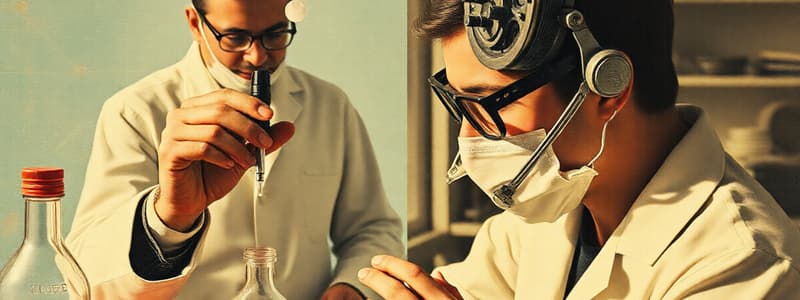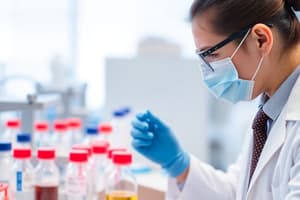Podcast
Questions and Answers
What is the primary purpose of quality control (QC) in a laboratory setting?
What is the primary purpose of quality control (QC) in a laboratory setting?
- To increase the speed of testing processes
- To reduce the number of experiments conducted
- To ensure accurate, reliable, and reproducible results (correct)
- To minimize employee overtime
Which of the following is a component of quality assurance?
Which of the following is a component of quality assurance?
- Marketing strategies
- Budget allocation
- Employee vacation scheduling
- Assessment and monitoring (correct)
Why is quality control important in clinical and diagnostic laboratories?
Why is quality control important in clinical and diagnostic laboratories?
- To reduce the cost of laboratory equipment
- To limit the amount of research conducted
- To increase the number of patients seen daily
- To ensure the accuracy of test results, which impacts patient care (correct)
What does 'accuracy' refer to in the context of quality control?
What does 'accuracy' refer to in the context of quality control?
What does 'precision' refer to in the context of quality control?
What does 'precision' refer to in the context of quality control?
What are SOPs (Standard Operating Procedures) used for in laboratories?
What are SOPs (Standard Operating Procedures) used for in laboratories?
What is the aim of internal quality control (IQC)?
What is the aim of internal quality control (IQC)?
What is a 'control sample' used for in quality control?
What is a 'control sample' used for in quality control?
What is 'proficiency testing'?
What is 'proficiency testing'?
What does external quality control (EQC) involve?
What does external quality control (EQC) involve?
Which regulatory standards are laboratories often required to adhere to?
Which regulatory standards are laboratories often required to adhere to?
What is the purpose of equipment calibration?
What is the purpose of equipment calibration?
What is the aim of using control samples?
What is the aim of using control samples?
What does proficiency testing enable?
What does proficiency testing enable?
What is one of the benefits of Quality Control in laboratories?
What is one of the benefits of Quality Control in laboratories?
Which action does Quality Control refer to?
Which action does Quality Control refer to?
What does Quality Assurance refer to?
What does Quality Assurance refer to?
Why would Quality Control adhere to regulations?
Why would Quality Control adhere to regulations?
What can Quality Control minimize?
What can Quality Control minimize?
What does Quality control encompass?
What does Quality control encompass?
Flashcards
Quality Control (QC)
Quality Control (QC)
A systematic process ensuring the accuracy, reliability, and reproducibility of lab results.
Quality Assurance
Quality Assurance
A component of quality assurance that includes assessment, monitoring, program development and quality improvement.
Accuracy and Reliability in QC
Accuracy and Reliability in QC
The primary objective of Quality Control in a laboratory setting.
Compliance with regulations
Compliance with regulations
Signup and view all the flashcards
Prevention of Errors and Contamination
Prevention of Errors and Contamination
Signup and view all the flashcards
Accuracy
Accuracy
Signup and view all the flashcards
Precision
Precision
Signup and view all the flashcards
Quality Control (QC)
Quality Control (QC)
Signup and view all the flashcards
Quality Assurance (QA)
Quality Assurance (QA)
Signup and view all the flashcards
Standard Operating Procedures (SOPs)
Standard Operating Procedures (SOPs)
Signup and view all the flashcards
Internal Quality Control (IQC)
Internal Quality Control (IQC)
Signup and view all the flashcards
Use of Control Samples
Use of Control Samples
Signup and view all the flashcards
Equipment Calibration
Equipment Calibration
Signup and view all the flashcards
Proficiency Testing
Proficiency Testing
Signup and view all the flashcards
External Quality Control (EQC)
External Quality Control (EQC)
Signup and view all the flashcards
Proficiency Testing Programs (PTPs)
Proficiency Testing Programs (PTPs)
Signup and view all the flashcards
Inter-laboratory Comparisons
Inter-laboratory Comparisons
Signup and view all the flashcards
Study Notes
- Quality Control (QC) is a systematic process used in a lab setting
- It ensures tests and experiments are accurate, reliable, and reproducible
- QC encompasses the steps, techniques, and tools that help monitor, evaluate, and maintain consistency and reliability of laboratory processes
- Laboratory QC is essential for ensuring test result validity, meeting regulatory standards, and maintaining credibility of a lab's output
Quality Assurance Components
- Assessment and monitoring
- Program development
- Quality improvement (quality control)
Importance of Quality Control in Laboratories
- The primary goal of QC is to ensure accurate and reproducible test results
- QC is crucial in clinical diagnostics, pharmaceuticals, environmental testing, and research
- Labs must adhere to regulatory standards like Good Laboratory Practices (GLP), ISO/IEC 17025, and Clinical Laboratory Improvement Amendments (CLIA)
- QC helps labs comply with these guidelines and accreditation requirements
- Accurate test results are vital in clinical/diagnostic labs for patient care, treatment decisions, and public health
- QC identifies errors in lab processes before they affect results
- Early problem identification through QC minimizes waste and the need for re-testing
Key Concepts of Quality Control
- Accuracy refers to how close a measured result is to the true value
- Precision refers to how reproducible results are under the same conditions
- Quality Control refers to procedures/actions taken to monitor and verify the accuracy and precision of lab results
- Quality Assurance refers to the overall management system designed to ensure that lab activities meet predefined quality standards
- Standard Operating Procedures (SOPs) are written documents that provide instructions on proper methods/procedures for each test/analysis
Types of Quality Control
- Internal Quality Control (IQC) involves processes/checks carried out within a lab regularly
- IQC aims to monitor and maintain the quality of results generated
- Control samples with known results are used regularly to test lab equipment and procedures
- Instruments are calibrated regularly to ensure accuracy
- Blinded samples are sent for internal analysis and compared with known values for proficiency testing
- External Quality Control (EQC) involves participating in external proficiency testing programs
- Laboratories send results to an external agency or organization for evaluation of accuracy compared to other labs
- Labs submit test results to an external body via Proficiency Testing Programs (PTPs) for comparison with other labs
- Inter-laboratory Comparisons involve comparing results from different labs to identify discrepancies or biases
Benefits of Quality Control
- Improved Accuracy and Reliability
- Regulatory Compliance
- Enhanced Confidence
- Cost Efficiency
- Continuous Improvement
Studying That Suits You
Use AI to generate personalized quizzes and flashcards to suit your learning preferences.




